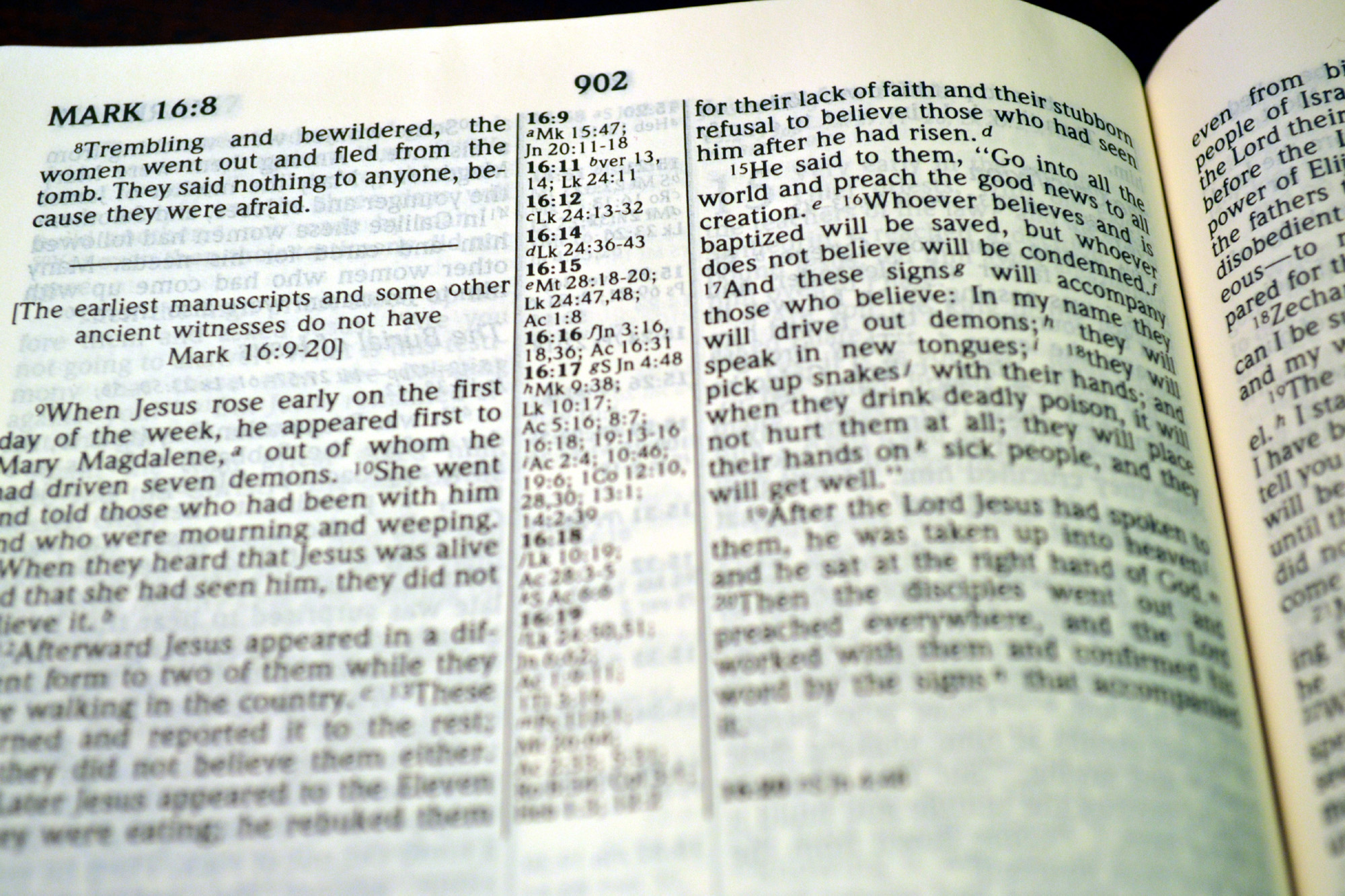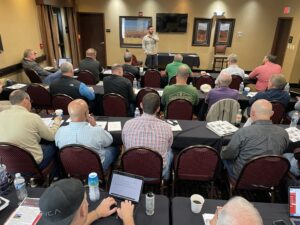
NASHVILLE (BP) — While preparing to preach on Christ’s resurrection from Mark 16, pastors will encounter a note in most modern Bible translations something like this: “Some of the earliest manuscripts do not include verses 9-20.”
 That note should not confuse pastors or cause them to question the reliability of the Bible, five veteran preachers from across the U.S. told Baptist Press. The preachers advocated a variety of approaches to Mark 16 but agreed that the chapter affirms Christ’s bodily resurrection regardless of where it ends.
That note should not confuse pastors or cause them to question the reliability of the Bible, five veteran preachers from across the U.S. told Baptist Press. The preachers advocated a variety of approaches to Mark 16 but agreed that the chapter affirms Christ’s bodily resurrection regardless of where it ends.
“At the end of the day, the most important truth coming out of Mark 16 is the bodily resurrection of Jesus,” said Corey Abney, pastor of the Cincinnati-area Florence Baptist Church of Mt. Zion in Florence, Ky. “Therefore, we should never teach Mark 16 in such a way that people grasp a longer or shorter ending but miss the Gospel.”
The controversy over Mark’s last chapter centers on its ending. Some of the oldest manuscripts end after verse 8, with an angel announcing Jesus’ resurrection to three women and the women feeling fear and astonishment. Early church fathers like Clement of Alexandria and Origen did not mention verses 9-20 when commenting on Mark 16, and the third- and fourth-century historian Eusebius said “the most accurate” copies and “almost all the copies” of Mark end at verse 8, Abney said, adding that the “style of Mark 16:9-20 is much different than the rest of the book.”
On the other hand, most manuscripts contain verses 9-20, including the Greek texts on which the King James Bible is based. The so-called “long ending” does not contradict other resurrection accounts, and the second-century church leader Irenaeus appeared to quote the end of Mark 16 as authoritative Scripture.
So what should pastors tell their congregations about Mark 16? Should they preach it as Scripture or argue that it’s not part of what Mark wrote? The five preachers surveyed by BP — all of whom affirm Scripture’s inerrancy — explained their views:
— Abney believes verses 9-20 were not part of Mark’s original Gospel, and he recommends not preaching on those verses.
“On the one hand, I would not turn the pulpit into a seminary classroom and use half of my preaching time to explicate the reasons I accept the shorter ending,” Abney said. “On the other hand, I would explain my reasons for ending my preaching/and or series at 16:8, followed by an exposition and application of 16:1-8.
“In my view, Mark’s Gospel contains enough information about the resurrection that one does not have to supplement it with the other Gospels. If a pastor plans to discuss events and appearances after the resurrection, however, then clearly he must supplement his sermon with details from Matthew, Luke and John,” Abney said.
— Stephen Horn, pastor of First Baptist Church in Lafayette, La., agreed that verses 9-20 likely were not in the original text of Mark. But citing biblical scholar Bruce Metzger, Horn said the long ending should probably still be received as New Testament Scripture.
“The so-called longer ending was widely known before the establishment of the canon [the authoritative collection of New Testament books],” Horn said. “This variant reading, even though lengthy, did not seem to trouble the early church.”
Horn would “certainly” deliver a message from Mark 16:9-20 if he were preaching through Mark’s Gospel, but he does not regard it as “the best text for Easter Sunday.” Everything in the long ending, “when properly understood,” is consistent with the rest of the New Testament, and preaching it can give church members confidence in the inerrancy of Scripture, he said.
“People in the pew need to know that we have a reliable text. Pastors should work toward helping their congregation know that the work of textual criticism does not cast doubt on the authority of Scripture, but actually helps document a reliable text. For me that means preaching this text like other texts, but explaining the difficulty surrounding it. To avoid this text altogether might lead some to doubt other parts of God’s Word,” Horn said.
— Michael Nolen, pastor of the San Francisco-area Southwinds Church in Tracy, Calif., does not believe verses 9-20 were part of Mark’s original Gospel. Some scholars speculate that the original ending was lost, Nolen said, but Mark may simply have chosen to end his book at verse 8.
“I do think the seemingly strange ending of fear, trembling and amazement can be seen to fit in with the Gospel as a whole,” Nolen said. “Mark has many references throughout his Gospel to people responding precisely this way to Jesus’ teaching and miracles.
“A number of people have also pointed out that Mark’s abrupt ending fits with the abrupt way he begins his Gospel (no birth narrative, etc.). Some have suggested that Mark’s ‘incomplete’ ending points to his contention that the story of Jesus and His work was continuing beyond the time he wrote, in the lives of Christ-followers,” Nolen said.
When preaching Mark 16, Nolen focuses on the short ending.
“I would deal briefly with the textual issues in verses 9-20, focusing on 16:1-8, and talking about the potential applications a seemingly puzzling ending like verse 8 would have for our lives,” Nolen said.
— John Mann, pastor of La Junta Baptist Church in Springtown, Texas, said, “It seems best to conclude that, though verses 9-20 do not appear to be part of the original ending, they are consistent with the biblical narrative, and can therefore be preached with confidence.”
Pastors should neither avoid the long ending, which “may communicate that there is a problem with the text as we have it,” nor bog a congregation down with extensive discussion of scholarly debate surrounding the passage, Mann said. “The pastor should briefly acknowledge the issue, but affirm that what is contained is consistent with the Word of God, and therefore, we can accept it as reliable.”
When preaching on Mark 16’s references to snake handling and drinking poison, Mann said, pastors should not “develop a doctrine that is not supported in the rest of Scripture.”
“Keeping these things in mind, the pastor can confidently preach Mark 16:9-20 without doing harm to conservative biblical theology, causing concern regarding the reliability of Scripture as we have received it, or contradicting the doctrine of inerrancy,” Mann said.
— Jeff Black, pastor of New Life Community Fellowship in Pittsfield, Mass., believes the long ending “is most likely not original.” But because of his uncertainty, he “would preach Mark 16:9-20 and explain the difficulty surrounding it.”
A Christian’s preferred Bible translation may affect his or her view of Mark 16, since the King James and New King James Versions are based on Greek texts that include the long ending, Black noted. He offered advice to all pastors regardless of their view on Mark 16.
“Be transparent by sharing with the congregation what you believe and how you came to believe it. I think it is better to be concise when explaining these things in a sermon and to offer further discussion later with anyone who has questions,” Black said.
“Be consistent by treating all passages with the same careful approach, such as the passage in John 7:53-8:11 [which some argue was not in the original text]. Finally, be confident by making certain your congregation understands that you have the utmost trust in the Bible as God’s inerrant Word. We must make it clear that God has preserved His Word and we have a perfect record of His revelation. Textual criticism, properly applied, has helped us discover how God has done that,” Black said.















